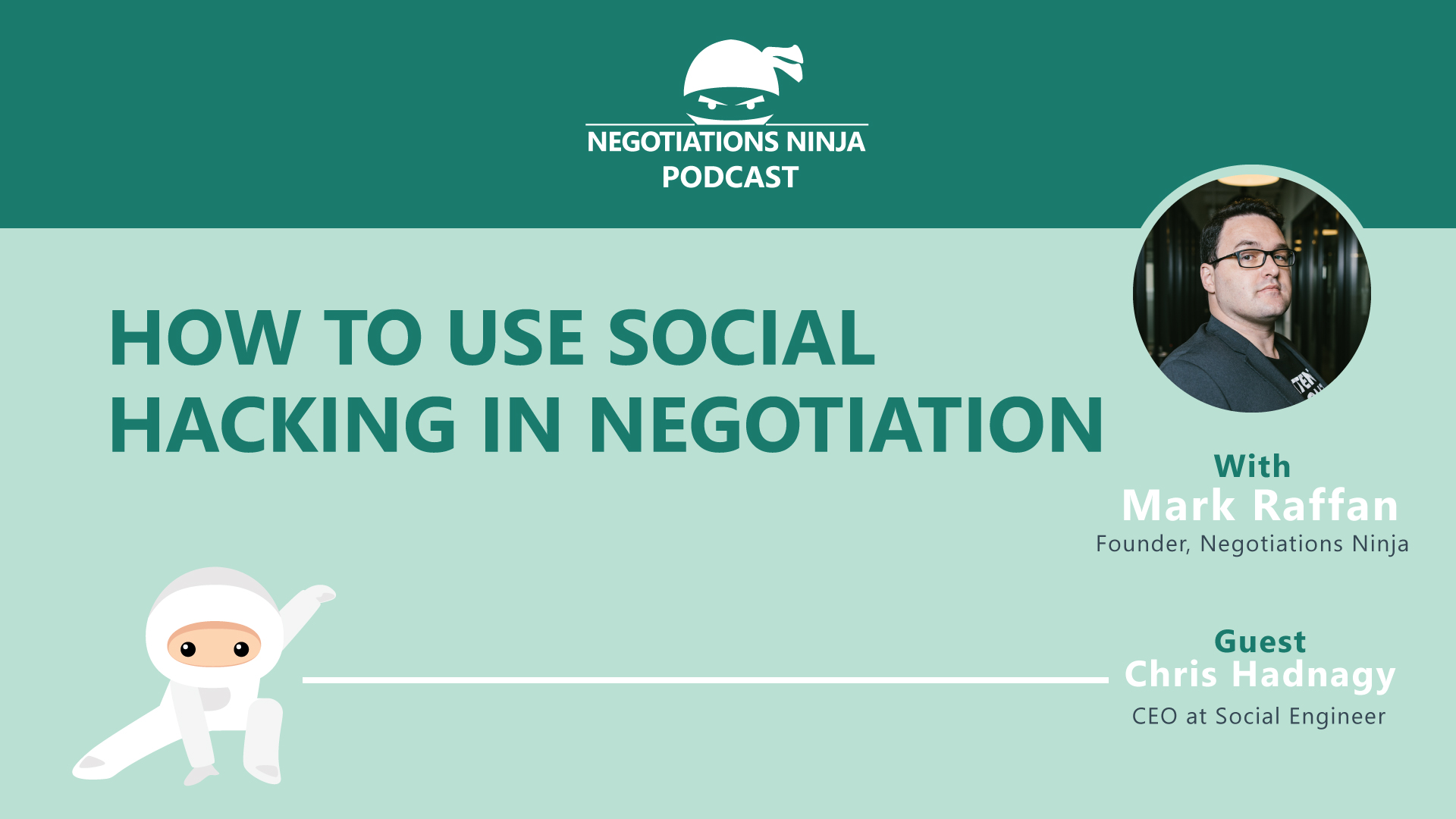When you hear the term “social hacking” you might think of a covert, manipulative way of prying into someone’s life. That’s not at all what we’re talking about when we apply the term to negotiation. Social hacking is an approach to information gathering that comes from the discipline known as “Social Engineering.” That’s a field that my guest, Chris Hadnagy has become known for.
Chris is the CEO, Founder, and Chief Human Hacker of Social-Engineering, LLC, and author of the phenomenal book, “Social Engineering: The Art of Human Hacking.” In this conversation, you’re going to learn what social engineering really is, why it doesn’t have to be a negative thing, and how to use its techniques to gather information and gain a competitive advantage that leads to success in your negotiation and procurement responsibilities.
Outline of This Episode
- [0:36] Why you’ll enjoy this insightful and provoking conversation with Chris
- [1:30] How Chris moved into this realm and what he means by the term “Social Engineering”
- [3:53] Could you walk into a cafe and gain information by what you see?
- [8:27] Three things to master in order to become a master of conversation
- [13:49] What is preloading and how does it work?
- [17:07] How to verify information through deliberate false statements
- [21:00] Maintain the relationships you’ve allowed to wane through instant rapport
Discovering details about people and situations in a common cafe scene
To introduce the topic of social hacking let’s imagine ourselves in an ordinary cafe. Your job is to observe and ascertain details about a particular individual. Are you ready to put on your “spy” hat? There are so many things you can learn just by observation. Age, skin color, tattoos, wedding rings, markings, type of phone the person uses. These are just the beginning.
Now casually stand behind the person as you prepare your coffee, a practice Chris calls “shoulder surfing.” What webpages are on the computer screen? What icons are on the desktop? Can you find evidence of the social media platforms the person uses the most? These pieces of information open the door to a conversation that will feel familiar and natural to the person. Keep listening to learn how to use techniques like these in your next negotiation or procurement scenario.
Master these three things to benefit from ordinary conversation
Conversation is the way we get to know people, the way we understand who they are and what is going on in their lives. It’s also how negotiators glean information that helps them move their party’s interests forward. Chris highlights three things that need to be mastered to make the most of conversations:
1 – Be confident without being arrogant
2 – Have and use knowledge well
3 – Engage in the conversation without being greedy
These sound like common sense, but when Chris explains them you’ll see that there is much more to each of them than is obvious at first glance. The nuance and clarity he provides are crucial to becoming the best procurement or negotiation professional possible. Make sure you listen to get all the details.
Rapport means that a person feels they can trust you and that they like you
There is an underlying truth behind all social hacking and social engineering. It’s this: People like people who like them. So when you are able to demonstrate that you enjoy interacting with an individual, you’ve started building rapport. From there you need to show genuine interest and find ways to validate the person in terms of skills, competence, or insight. But it doesn’t stop there. Be sure you focus on the person, avoiding distractions, giving them your full attention. As you listen deeply, respond appropriately, and ask follow-up questions you’ll nudge the relationship more deeply into a place of trust. That’s what you want.
Deliberate false statements are an amazing way to collect information
Imagine you need to know a person’s birthdate (for sake of illustration). That’s not a piece of information most people casually hand out to strangers. But you can use deliberate false statements to get the person to volunteer the information. How does it work? It’s based on the fact that human beings have a natural inclination to correct things that are wrong. We all like to look knowledgable or helpful. False statements tap into that tendency.
Here’s an example Chris uses: You see a young woman outside a natural food store eating strawberries. You walk up and say, “Hey, you’re eating strawberries! That means you must be born in February!” Most likely, she’ll say something like this, “No, I was born in September.” Then you follow up by saying, “Oh, September 2nd, like my sister?” The young woman will very likely respond with her actual birthdate.
One caution: You can’t use this technique too often. The person will quickly discern what you’re doing and you’ll seem a bit creepy! Listen to hear all of Chris’s advice and social hacking techniques!
Resources & People Mentioned
- BOOK: Social Engineering
- SPONSOR: ProcureCon West: Use the code “PIW19NN”
Connect with Chris Hadnagy
- Follow Chris on LinkedIn
- Follow Chris on Twitter: @HumanHacker
- Chris’ company Social-Engineer
- Social-Engineer on LinkedIn
- Social-Engineer on Twitter: @SocEngineerInc
Connect With Mark
- Follow Negotiations Ninja on Twitter: @NegotiationPod
- Connect with Mark on LinkedIn
- Follow Negotiations Ninja on LinkedIn
- Connect on Instagram: @NegotiationPod




